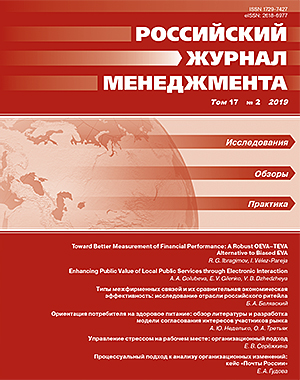Managing Workplace Stress: Organizational Approach
DOI:
https://doi.org/10.21638/spbu18.2019.205Abstract
Evolution of the modern labor market creates new risks, including socio-psychological, among which workplace stress has a special place. In order to prevent productivity and financial losses, company management needs to handle the new type of risk. Existing technologies of stress management proposed by psychological literature are insufficient. We elaborate a new group of theories that consider workplace stress as a social problem and propose that not only individuals but also organizations are responsible for regulation of stress-based risks. The paper describes key approaches to stress research and systematizes different levels of stress factors including organizational and macrosocial factors. We then present and analyze European models of stress management on the firm level and the elements of government policy for the workplace stress regulation and highlight the key research gaps that specifically important in the Russian context.
Keywords:
workplace stress, organizational approach, stress management, stress factors, psychosocial risks
Downloads
References
REFERENCES IN LATIN ALPHABET
Translation of references in Russian into English
Downloads
Published
How to Cite
Issue
Section
License
Articles of the Russian Management Journal are open access distributed under the terms of the License Agreement with Saint Petersburg State University, which permits to the authors unrestricted distribution and self-archiving free of charge.





